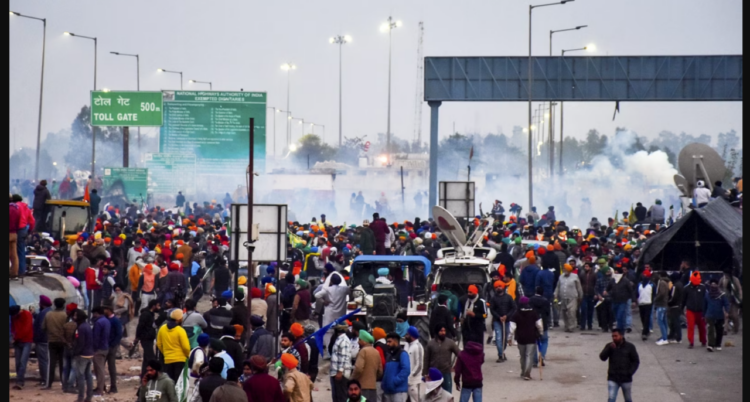Delhi-NCR is reeling under massive traffic jams, impacting every day lives. Meanwhile, the Farmers have resumed their protests pressing for minimum support price, after their talks with the union ministers did not lead to any concrete conclusion. The Samyukta Kisan Morcha have declared that the protestors will aim to head to Delhi, pressing the Centre to meet their demands.
In a renewed attempt to disrupt law and order, Farmers are conducting protests, demanding swift implementation of Swaminathan Commission’s recommendation and promulgation of a law guaranteeing minimum support price (MSP), among others.
- Legal guarantee on MSP
The protestors are demanding that there should be a law on MSP guarantee, speculating that the government may rescind the policy in future. But the protestors are failing to witness that in lieu of withdrawing the policy, the union government has on a year on year basis have increased the MSPs for at least 22 crops.
For eg. The government procures substantial quantities of two primary crops, wheat and paddy (i.e., rice). The Minimum Support Price (MSP) for paddy has seen a 61% rise, going from Rs 1,360 per quintal in 2014-15 to Rs 2,183 per quintal in 2023-24. Similarly, the MSP for wheat has witnessed a 57% increase, climbing from Rs 1,450 per quintal in 2014-15 to Rs 2,275 per quintal in 2023-24.
2. Complete Debt Waive Off
- Repeated studies have shown that complete agricultural loan waivers are not concrete solutions to the issues faced by the farmers, on account of natural causes like drought, or floods. There is no guarantee that farmers will not default on the subsequently sought loans.
- Complete debt waive off will worsen Fiscal issues, as the loan waivers not only add to existing fiscal deficit of Centre, state governments and also affect the credit availability of the market.
- In addition, when large sums are being contributed to financing debt, then it leads to less disposable money available for executing irrigation schemes, which again have been suggested by the Swaminathan Commission.
- There is also lack of vigilance over who would ultimately benefit from debt waivers, because there have been multiple instances where the benefits of such waivers have been obtained by parties which are not eligible.
3. Monthly pensions to Farmers
- A senior member of the Punjab Kisan Mazdoor Sangharsh Committee has demanded that the government must pay a of Rs 10,000 per month to all farmers and farm labourers above the age of 60.
- While some argue that the government is ignoring welfare of the farmers, and let them become victim to market forces, the government ensures minimum income support for the farmers. Under the Pradhan Mantri Kisaan Sammaan Nidhi (PM-KiSaN), all land owning small and marginal farmers receive a sum of Rs 6,000 per year in three installments.
- In addition, farmers receive income support from various state governments. For example, in Andhra Pradesh, the Annadata Sukhibhava scheme provides an extra amount of Rs 9,000 to farmers already benefiting from the PM-KiSaN, while those not covered by the latter receive assistance amounting to Rs 15,000.
4. Bring back the 2013 Land Acquisition Act everywhere, making sure landowners agree and get compensation four times the collector rates
To increase compensation, would affect the entire rural economy in the long run. As the construction of infrastructure in these aspects would increase exorbitantly for the government.
5. End all current free trade agreements and leave the World Trade Organization (WTO) to safeguard the interests of Indian farmers
- India consistently voiced concerns at the WTO about the negative impacts of the widespread application of free trade agreements.
- Countries like Canada and the United States criticized India for ensuring Minimum Support Prices (MSP) for crops like sugarcane and wheat, claiming it hindered their ability to freely sell agricultural products in India.
- Many US Congress members questioned the legality of Indian subsidies for rice, wheat, and cotton, arguing it violated the WTO’s agriculture agreement, which limited subsidies to 10% of production value.
- Despite standing firm on agricultural subsidies, India also resisted regional comprehensive economic partnership agreements, preventing the influx of dairy products from China, New Zealand, and Australia. A complete withdrawal from WTO and termination of existing FTAs would undermine India’s negotiation efforts while protecting its interests.

















Comments